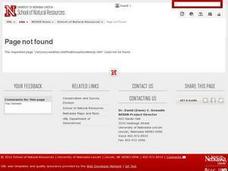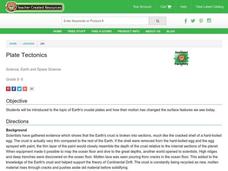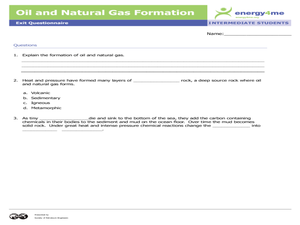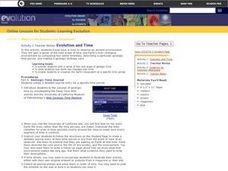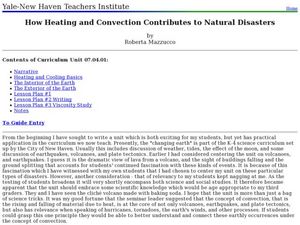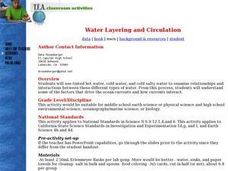Curated OER
Earth's Atmosphere and Temperature
Students explore the layers of earth's atmosphere and conduct an experiment to identify carbon dioxide. They construct models using styrofoam to represent molecules in the atmosphere's layers. To discover how sunlight efffects...
Curated OER
Explosive Ideas!
Students explore the layers of the Earth and the dynamic changes that they cause on Earth's surface. Volcanoes and earthquakes become the focus of the lesson as the Oregon State quarter and its Crater Lake images are linked to the topic.
Curated OER
Layering the Air
Learners study the layer of the atmosphere. In this lesson on the atmosphere, students discuss the composition of the air around us and how the atmosphere was formed. Learners create a scale model of the layers of the atmosphere.
Curated OER
Our Ever Changing Earth
First graders discover plate tectonics. They observe the forces of erosion. They observe the forces of weathering. They state three ways the earth changes. They record observations and make conclusions about their observations.
Curated OER
Plate Tectonics
Students complete a data sheet. In this Earth composition lesson, students learn what happens when the Earth's plates push against each other. They watch a teacher demonstration and complete a data sheet.
Curated OER
Oil and Natural Gas Formation
Students complete a narrative paper and a drawing depicting how the formation of oil and natural gas taken from the Earth's crust were once plants and animals millions of years ago. In this oil and natural gas lesson plan, students read,...
Curated OER
Earth's History
Seventh graders study the law of superposition by creating models of fossils in layers of rock. They examine how fossils are usually found in sedimentary rock which leads to the study of geologic history in those rocks.
Curated OER
Happy Birthday, Earth!
Young scholars visualize the Earth's ecosystem at a specific time period and how Earth has changed over time. They create a detailed journal entry for a specific time period and create a birthday card to Earth.
Curated OER
Basin & Range Faulting
Young scholars identify that the crust of the earth is constantly moving and that with the exception of faults accompanied by earthquakes, this rate of movement is far too slow to notice. Then they print a copy of cross-section map A and...
Curated OER
Rocks and Minerals
Students are able to describe earth processes (e.g., rusting, weathering, erosion) that have affected selected physical features in students, neighborhoods. They are able to identify various earth structures (e.g., mountains, faults,...
Curated OER
Graham Cracker Plate Tectonics
In this plate tectonics worksheet, students use Graham crackers, frosting, water and a paper plate to simulate tectonic processes such as convergent, divergent and transforming plate boundaries.
Curated OER
How Heating and Convection Contributes to Natural Disasters
Learners study the basics of heating and cooling and how it pertains to the earth. In this global instructional activity students read the Magic Tree House book then create a chart of their findings.
Curated OER
Soil Layers
Ninth graders identify the different layers of soil. In this earth science lesson, 9th graders explain how limestone layers are formed. They identify the different parts of the coral colony.
Curated OER
Your Own Backyard
Students study Earth's features and their local environments. In this Earth's features lesson, students take a field trip to observe a natural environment and students sketch their observations of the nature. Students watch videos about...
Curated OER
Investigating the Soil
Students explore the Earth's crust by researching pH levels and acidity. In this environmental safety lesson plan, students identify the pros and cons of acidity within soil and how it affects plants. Students collaborate in a pH level...
Curated OER
Stratospheric Ozone
Students explore about the structure of Earth's atmosphere and about the stratospheric ozone. They discuss how it is produced and destroyed, where it is located, why it is important, and how it is changing. Students investigate about...
Curated OER
Incorporating 3D Visualizations into Your Classroom
Students make observations through 3-D visualizations. They explore scientific and geologic processes through the use of 3-D pictures.
Science Matters
Finding the Epicenter
The epicenter is the point on the ground above the initial point of rupture. The 10th lesson in a series of 20 encourages scholars to learn to triangulate the epicenter of an earthquake based on the arrival times of p waves and s...
Teach Engineering
An Introduction to Air Quality Research
Viewers are a PowerPoint are exposed to the idea that pollutants are in more than just the air we breathe. the presentation provides information about the layers of the earth's atmosphere and takes a look at the pollutants in the...
Science Matters
Earthquake Preparedness
Forty-five states and territories in the USA are at moderate to very high risk of earthquakes. The discussion-based instructional activity covers what to do before, during, and after an earthquake. The 14th instructional activity in...
Curated OER
Water Layering and Circulation
Students examine relationships and interactions between different types of water. They experiment with colored water of different temperature and salinity and discuss how the results relate to real ocean currents.
Curated OER
Environmental Studies: The Environment Rocks!
Rock exploration, so exciting! After reading the book Everybody Needs a Rock, the class makes sandwiches to better understand that the Earth is made in layers. They then use a description of the 3 types of rock to conduct an observation...
Curated OER
Understanding Lava Layers
Seventh graders trace the lava flow of an erupting volcano. In this earth science lesson, 7th graders experiment using baking soda and vinegar. They record and share their observations.
National Wildlife Federation
Why All The Wiggling on the Way Up?
Some of the CO2 emitted by burning fossil fuels is removed from the atmosphere by natural sinks, such as the ocean. The fifth engaging lesson in the series of 21 examines the CO2 data from three very different locations. It then makes a...


